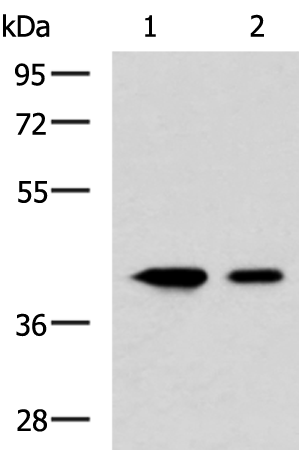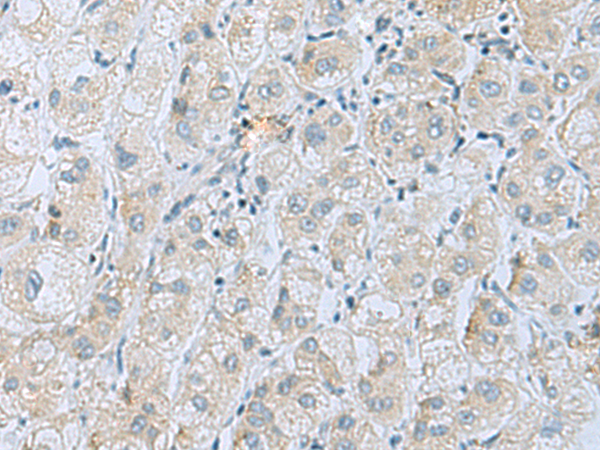

| WB | 咨询技术 | Human,Mouse,Rat |
| IF | 咨询技术 | Human,Mouse,Rat |
| IHC | 1/25-1/50 | Human,Mouse,Rat |
| ICC | 技术咨询 | Human,Mouse,Rat |
| FCM | 咨询技术 | Human,Mouse,Rat |
| Elisa | 1/5000-1/10000 | Human,Mouse,Rat |
| Aliases | CTGF; NOV2; HCS24; IGFBP8 |
| WB Predicted band size | 38 kDa |
| Host/Isotype | Rabbit IgG |
| Antibody Type | Primary antibody |
| Storage | Store at 4°C short term. Aliquot and store at -20°C long term. Avoid freeze/thaw cycles. |
| Species Reactivity | Human, Mouse, Rat |
| Immunogen | Synthetic peptide of human CCN2 |
| Formulation | Purified antibody in PBS with 0.05% sodium azide and 50% glycerol. |
+ +
以下是关于CCN2(CTGF)抗体的3篇参考文献及其摘要内容概括:
---
1. **"Targeting CCN2 in Fibrotic Diseases: Mechanisms and Therapeutic Perspectives"**
- **作者**: Jun, J.I. et al.
- **摘要**: 本文探讨了CCN2在肝纤维化中的作用,通过特异性抗体抑制CCN2活性可显著减少胶原沉积和纤维化标志物表达,提示其在抗纤维化治疗中的潜力。
---
2. **"Anti-CTGF Antibody Attenuates Renal Fibrosis in Diabetic Nephropathy"**
- **作者**: Riser, B.L. et al.
- **摘要**: 研究利用CCN2单克隆抗体干预糖尿病肾病模型,发现其能降低肾小球硬化及间质纤维化程度,证实CCN2抗体对延缓肾脏病变进展的有效性。
---
3. **"CTGF as a Therapeutic Target in Chronic Fibrosis: Focus on Antibody-Based Inhibition"**
- **作者**: Lipson, K.E. et al.
- **摘要**: 综述分析了CCN2在慢性纤维化疾病中的核心作用,总结了抗体靶向CCN2的临床前及临床试验结果,强调其在肺纤维化和系统性硬化症中的治疗前景。
---
4. **"Inhibition of CTGF/CCN2 by Neutralizing Antibody Ameliorates Lung Fibrosis in Vivo"**
- **作者**: Grotendorst, G.R. et al.
- **摘要**: 通过动物模型证明,中和CCN2抗体可显著减轻博来霉素诱导的肺纤维化,减少炎症细胞浸润和细胞外基质积累,支持CCN2作为肺纤维化治疗靶点。
---
这些文献涵盖了CCN2抗体在肝、肾、肺纤维化中的机制及治疗应用,包括实验研究和综述分析。
The CCN2 antibody targets connective tissue growth factor (CTGF/CCN2), a matricellular protein belonging to the CCN family (Cyr61. CTGF, Nov). CCN2 plays critical roles in cell proliferation, adhesion, migration, and extracellular matrix (ECM) remodeling, particularly during tissue repair and fibrotic processes. It interacts with growth factors like TGF-β, integrins, and ECM components, mediating pathways involved in fibrosis, angiogenesis, and wound healing. Dysregulated CCN2 expression is linked to pathological conditions, including diabetic nephropathy, hepatic fibrosis, systemic sclerosis, and cancer progression.
CCN2 antibodies are essential tools for detecting and quantifying CCN2 in techniques such as Western blotting, immunohistochemistry, ELISA, and immunofluorescence. They enable researchers to study CCN2's expression patterns, localization, and functional roles in disease models. Both monoclonal and polyclonal variants are available, with monoclonal antibodies offering high specificity and polyclonal antibodies providing broader epitope recognition. Neutralizing CCN2 antibodies further allow mechanistic studies by blocking its biological activity.
Research using CCN2 antibodies has advanced understanding of fibrotic pathways and therapeutic targeting. Inhibiting CCN2 has emerged as a potential strategy to mitigate fibrosis and tumor metastasis. However, challenges remain, such as ensuring antibody specificity due to structural similarities among CCN family members. Overall, CCN2 antibodies remain pivotal in elucidating the protein's dual roles in tissue homeostasis and disease pathogenesis.
×